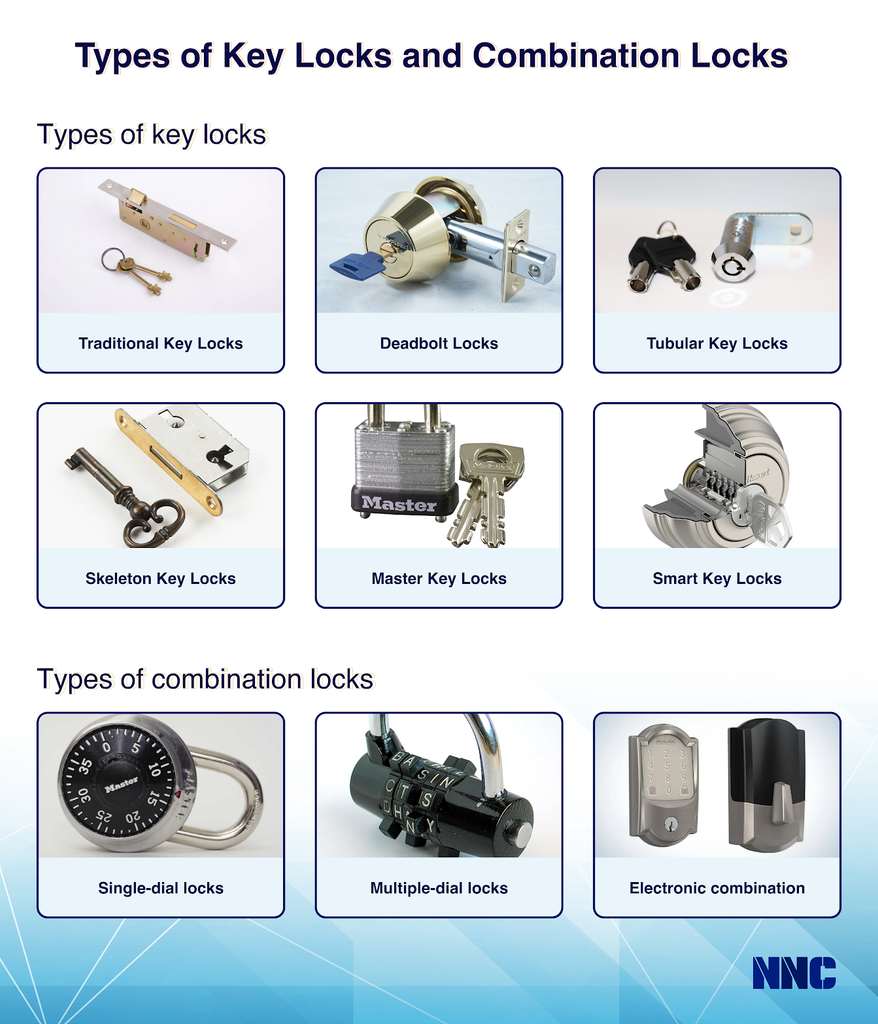Combination Locks vs. Key Locks: Which One To Choose?
Thinking of choosing between a combination of key locks for your home or business? This guide will run you through all types of key and combination locks on the market and their benefits and disadvantages.

What is a Key Lock?
Key locks are traditional locks that need a key to be opened. A key lock consists of a series of small pins or wafers within a cylinder. When the correct key is inserted into the lock, it aligns the pins or wafers at the shear line (where the inner cylinder begins to turn separately from the outer cylinder), allowing the lock to turn and unlock.
Types of Key Locks
The many types of key locks on the market include:
- Traditional Key Locks: The standard lock and key system found on many doors and padlocks. They are often simple to use and relatively inexpensive.
- Deadbolt Locks: These locks provide additional security for doors and are often used in conjunction with a traditional key lock. They work by sliding a bolt into the door frame, which provides a strong barrier against forced entry.
- Tubular Key Locks: These locks use a tubular-shaped key and are often found on bike locks, vending machines, and high-security padlocks. A tubular key is circular and has grooves cut into the edge of the key at various points along the circle. These grooves are cut at different depths to interact with pin tumblers inside the lock.
- Skeleton Key Locks: These locks are less common today but are often found on older doors and furniture. They use a very simple key and are less secure than modern locks. The classic skeleton key has a cylindrical shaft and a single, broad, flat tooth or bit. This key bypasses the wards (obstructions) in a lock to rotate and unlock the inner mechanism.
- Master Key Locks: Master key system is one where two different keys can open selected locks. This includes an individual key, also known as a change key, that opens only one specific lock, and a master key that can open all locks in the system.
The system is commonly used in commercial and residential buildings where certain individuals, like property managers or maintenance personnel, need access to multiple rooms or units, while individual tenants only need access to their own space.
While a master key system can provide a lot of convenience, it's also important to note that it can potentially reduce the security of the lock system. If the master key is lost or stolen, all the locks in the system become vulnerable.
- Smart Key Locks:
A smart key lock is one not controlled by a traditional metal key. Smart locks can be controlled using various methods such as electronic keypads, biometric scanners, or wireless protocols like Bluetooth or Wi-Fi. You can often use a smartphone app to control this type of keys. Apps have features like access logs, temporary virtual keys for guests, and integration with other smart home devices. Smart key locks can be safer than traditional ones but are prone to hacker attacks.
Smart key locks include keypad or electronic code locks, Bluetooth or Wi-Fi locks, biometric locks, and smart home integration locks connected with a smart home system.
What is a Combination Lock?
A combination lock is a type of lock that is opened by turning the lock's dial in a specific sequence of numbers or characters. These locks are often used for lockers, safes, and briefcases. However, they can also be used for door locks.
Types of Combination Locks
The types of combination locks include:
- Single-dial locks: These are the most common type of combination lock. They typically have a single dial turned in alternating directions to enter the combination.
- Multiple-dial locks: These locks have several dials, each with its own set of characters. The lock opens when all the dials are turned to the correct combination.
- Electronic combination locks use electronic components to enter the combination, often with a keypad or touchscreen. They are commonly found on modern safes and high-security door locks.
Combination Locks and Key Locks Comparison Points

Here are several most important factors to consider when selecting between combination locks and key locks:
- Combination locks are more convenient.
Unlike key locks, combination locks do not require you to carry keys. Combination locks may be your best option if you are predisposed to losing keys. They are also more convenient if many people need to access the building, like in an office.
- Security depends on a particular brand and type of lock.
When it comes to choosing a lock type, security is the most important concern for customers.
Unfortunately, no locks are safe: key locks can be picked, and the keys can be lost, stolen, or duplicated.
Combination locks can also be cracked, especially using a simple numerical sequence. They can also be vulnerable to observational attacks (someone watching as you enter the combination), manipulation attacks (feeling or hearing the internal mechanisms of the lock to determine the combination), and brute force attacks (systematically trying all possible combinations). The main issue with combination locks is that the available numbers in a potential combination are finite, so it is possible to figure them out.
The solution to this problem is picking the best combination and key locks variations.
For electronic combination locks, this means choosing sturdy, electronic combination locks with more numbers in a combination. For key locks, pick keyed locks with complex keyways and additional security pins.
High-quality key locks and combination locks can both be very durable and resistant to physical attacks.
- The cost is similar and depends on the quality of the lock.
There is no significant variety in the price of combination and key locks of similar quality. In general, basic combination locks and key locks are often identical in price, but high-security versions of either can be pretty expensive.
All in all, choosing between combination locks and key locks is a matter of personal preference and the location where the locks will be used.
A combination lock can be a better option in a school or gym where multiple people need access to a locker. For home security, a key lock (or an electronic lock) might be preferable for its overall robustness and the ability to change the locks if the key gets lost. However, which lock to use is a personal choice. What matters is investing in high-quality locks.
NNC sells different kinds of combination locks for doors, including:


















